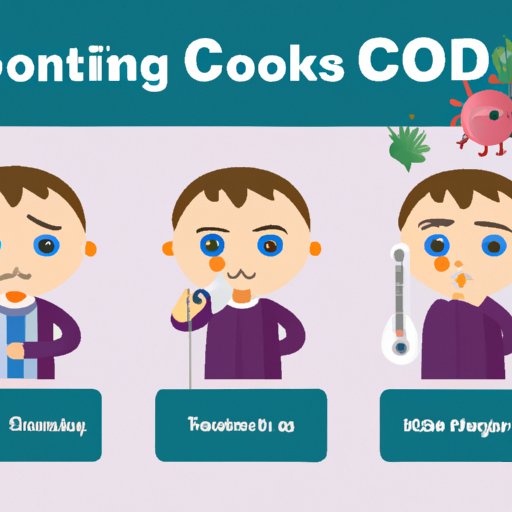Introduction
The common cold is one of the most widespread illnesses in the world. It’s caused by a virus, which means that antibiotics are useless against it. Most adults get two to four colds per year, while children may get up to eight or more. While it’s not usually serious, a cold can be very uncomfortable and inconvenient. In this article, we’ll explore how long are you contagious with a cold and provide advice for preventing and reducing the risk of spreading a cold.

Exploring the Length of Time a Cold is Contagious
How Long Does a Cold Last?
A cold typically lasts for about seven to 10 days, according to the Centers for Disease Control and Prevention (CDC). However, some people may have symptoms for up to three weeks. Common symptoms include a sore throat, sneezing, a stuffy or runny nose, coughing, fatigue, and a mild fever. If your symptoms last longer than 10 days or worsen, you should see a doctor.
Factors That Affect How Long a Cold is Contagious
There are several factors that can affect how long you’re contagious with a cold. These include age, overall health, and the type of virus causing the cold. For example, younger children tend to be more contagious than adults because their immune systems aren’t yet fully developed. People with weakened immune systems may also be more likely to be contagious for a longer period of time.

A Guide to the Incubation Period for the Common Cold
Symptoms to Look Out For
The incubation period for the common cold is typically two to four days after exposure. During this time, you may start to experience early symptoms such as a sore throat, sneezing, and a stuffy or runny nose. Other common symptoms include coughing, fatigue, and a mild fever.
Timing Your Cold: How Long Are You Contagious?
You’re most contagious during the first two to three days of your cold, when your symptoms are at their worst. After that, your body starts to produce antibodies to fight off the virus and you become less contagious. As your symptoms start to improve, you’ll be contagious for up to two weeks. According to the CDC, people with weakened immune systems may be contagious for even longer.
When to Stay Home and When to Return to Work or School After Catching a Cold
Guidelines for Returning to Work and School After Catching a Cold
It’s important to stay home from work or school when you have a cold to reduce the risk of spreading the virus. The CDC recommends staying home for at least 24 hours after your fever has gone away without the use of medication. If you have a weakened immune system, you should talk to your doctor about when it’s safe to return to work or school.
Tips for Reducing the Risk of Spreading a Cold
In addition to staying home when you’re sick, there are other steps you can take to reduce the risk of spreading a cold. Wash your hands frequently with soap and water for at least 20 seconds. Avoid touching your eyes, nose, and mouth with unwashed hands. Disinfect surfaces that are touched often, such as doorknobs, light switches, and countertops.
Dr. Amesh Adalja, an infectious disease specialist at Johns Hopkins University, recommends getting the flu vaccine to help reduce the risk of catching a cold. “The flu vaccine is the best way to prevent influenza, which is a much more serious illness than the common cold,” he says. “Getting vaccinated can also reduce the risk of getting a cold since many of the viruses that cause colds are included in the flu vaccine.”
Conclusion
Colds are highly contagious and can spread quickly. Knowing how long a cold is contagious can help you take steps to reduce the risk of spreading it. A cold typically lasts for seven to 10 days, but you’re most contagious in the first two to three days. After that, your body starts to produce antibodies and you become less contagious. To reduce the risk of spreading a cold, stay home when you’re sick, wash your hands frequently, and consider getting the flu vaccine.
(Note: Is this article not meeting your expectations? Do you have knowledge or insights to share? Unlock new opportunities and expand your reach by joining our authors team. Click Registration to join us and share your expertise with our readers.)
